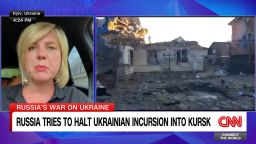CNN
—
Vladimir Putin fixed the commander in chief of Russia’s military, General Valery Gerasimov, with a cold stare and a look of exasperation. The video, released Wednesday by the Kremlin, showed the Russian president was not happy with news from the southern region of Kursk.
At that moment, hundreds of Ukrainian troops, backed by tanks and protected by air defenses, were advancing into the region. Russian soldiers were surrendering; hundreds of Russian civilians in and around the town of Sudzha were fleeing with anything they could grab.
In two-and-a-half years of warfare, it was an unprecedented Ukrainian incursion into Russia. Putin told the Kremlin meeting that it was “another major provocation” by Kyiv. The region’s acting governor declared a state of emergency, describing the situation as “very difficult.”
Above all, it was humiliating for a Russian state that prides itself on protecting the motherland.
The Kursk attack was an audacious and counter-intuitive move from the Ukrainian military, what one analyst describes as “doing the least obvious thing.”
Despite steadily losing ground in eastern Donetsk, it chose to send elements of experienced brigades into Russian territory, with the apparent goals of embarrassing the Kremlin and forcing the Russian Defense Ministry to redeploy resources and providing the home front with a much-needed morale boost.
George Barros at the Washington-based Institute for the Study of War says the Ukrainians “achieved operational surprise against great odds and are currently exploiting Russia’s lack of readiness in its border areas.” [The same tactic worked in September 2022 when they recovered much of occupied Kharkiv region within a week.]
The Russian regiment tasked with defending this part of the border abandoned its positions. Several dozen soldiers were taken captive, leading President Volodymyr Zelensky to express Friday “special gratitude to our warriors and units who are replenishing the ‘exchange fund’ – by taking the occupiers as captives and thus helping to free our people from Russian captivity.”
A column of Russian reinforcements was taken out by a missile attack near the town of Rylsk on Thursday night, possibly because the Ukrainians had managed to hack into multiple traffic cameras that are a feature of Russian highways. One Russian blogger, Aleksander Kots, said he had driven the route. “I noticed that there are cameras working along the entire highway. They are literally blinking their lights.”
Meeting little resistance, and with Russian communications in the region reportedly jammed by effective electronic warfare, the Ukrainian brigades pushed more than 20 kilometers (12 miles) inside Kursk in the first two days of the operation.
Good intelligence allowed advanced units to move still further forward in a somewhat chaotic battlefield, often bypassing Russian defenses. By Friday Russian authorities had lost control over at least 250 square kilometers of territory, according to several independent analyses and CNN’s mapping.
This wasn’t just a patch of empty Russian countryside. Among the places that came under Ukrainian control was a natural gas transit hub near the border through which Russia supplies Europe with substantial volumes of natural gas.
On Friday, a Ukrainian military Telegram channel declared the facility “under the control of the 99th mechanised battalion of the 61st Mechanized Brigade,” one of the experienced units involved in the assault. A video showed soldiers in front of the building, but Gazprom said Saturday that the pipeline was still operating.
Inside Russia, the sort of anger that had greeted setbacks at the beginning of the war was rekindled.
Andrey Gurulyov, a former commander in the region, reposted a comment on Telegram that demanded military prosecutors investigate decisions by commanders to transfer units from the Kursk region ahead of the attack.
And there was resentment amongst Russian civilians in the region, thousands of whom fled their homes. The head of the city of Rylsk – some distance from the most advanced Ukrainian units – said Friday more than half the population of 15,000 had left. Social media videos illustrated the frustration among civilians at the sluggish response of the military; some appealed directly to President Putin.
An Expeditionary Force
Ukrainian troops, even if reinforced, cannot expect to occupy several hundred square kilometers of Russian territory. This is very much an expeditionary force, albeit a battle-hardened one, that has exploited the absence of organized resistance to make ground quickly.
But holding a large chunk Russian territory is beyond their capacity and probably beyond their goal. Russian reinforcements will eventually make their mark, even if it takes them longer than three days to begin effective defense. On Saturday, the Russian Defense Ministry said units had “thwarted the attempts of the enemy’s mobile groups to get to the depth” of Russian territory near Ivashkovsky, Malaya Loknya, and Olgovka in the Kursk region. Olgovka is 20 kilometers from the border.
There were also signs Saturday that Russian ‘Lancet’ drones were beginning to degrade Ukrainian armour.
Emil Kastehelmi at the Black Bird group in Finland, which uses open-source intelligence to track the conflict says “time is running against Ukrainians – [the] Russians won’t be disorganized forever.”
Even if the Ukrainians need to pull back from more advanced positions, such an operation still serves several purposes. Barros says it “exposes some of Russia’s planning assumptions and critical vulnerabilities.” And Matthew Schmidt, who has taught strategic and operational planning at the US Army’s Command and General Staff College, said the Ukrainians’ “creative use of force was designed to put pressure on the decision-makers in Moscow” – and possibly cost some of them their jobs.
Russian military blogger Vladislav Shurygin crystallized all this in a Telegram post Friday, saying that the enemy had “very skilfully and accurately chosen a different strategy – taking advantage of the bureaucratic rigidity and sluggishness of the Russian management system, to exhaust Russia with continuous unexpected strikes on sensitive infrastructure and the civilian population, provoking discontent, disappointment and apathy.”
The Kursk operation also demonstrates to Ukraine’s allies that it still has the energy and imagination to surprise its enemy and embarrass the Kremlin at a time when much of the news from the frontline was bleak for Kyiv.
That’s not lost on Shurygin. “The goal of this new strategy is to put Russia before the prospect of an increasingly costly war (financially, reputationally and organizationally) and to force it to negotiate peace by November-December.”
Daniel Fried at the Atlantic Council says there is a long history of such surprise military raids – some inconsequential and others impactful. He recalls George Washington’s daring manoeuvre to cross the Delaware River in 1776, when he returned with captured prisoners and supplies and raised morale for the fight against the British.
Fried, a former US assistant secretary of state for Europe, says that by demonstrating Russia’s failure of intelligence and weakness along its border, the raid had punctured the Kremlin’s narrative “that Ukrainian resistance is useless and support for Ukraine is futile.”
Ukraine’s Kursk gambit forces the Russian Defense Ministry into some tough choices. It appears that existing groups in Kursk such as the National Guard, FSB and irregular elements are unable to combat the Ukrainians.
Barros told CNN that the military command may redeploy elements of the recently created Northern Grouping but the redeployment of significant elements “would likely further stretch these elements and create vulnerabilities in Russian defenses elsewhere along the border.”
Alternatively, it may call on Russia’s substantial reserves in a larger-scale operation – but these are critical for current Russian offensive operations inside Ukraine, where the continuous commitment of high numbers of troops has eroded Ukrainian defenses.
Or, Barros says, the Russians may turn to aviation to attack Ukrainian armor inside Kursk, thereby preventing Ukrainian forces from consolidating positions and assisting current Russian forces deployed in the area.
Whatever combination the Russians choose, they are trying to reverse a humiliating episode in the conflict just as sheer mass and air superiority in eastern Donetsk was beginning to deliver incremental progress, underpinning the Kremlin’s insistence that Ukraine give up four eastern regions as a condition for negotiations.
“The unfolding events demonstrate the extent to which Moscow has deeply depended on sanctuary in Russian territory to wage its war against Ukraine,” Barros told CNN. “Russia has undermanned its borders and border fortifications, relying on its perception of safety because it has not felt vulnerable.”
Across a southern border with Ukraine that is hundreds of miles long, that perception has been seriously, and unexpectedly, challenged.
Darya Tarasova and Maria Kostenko contributed reporting to this story.







